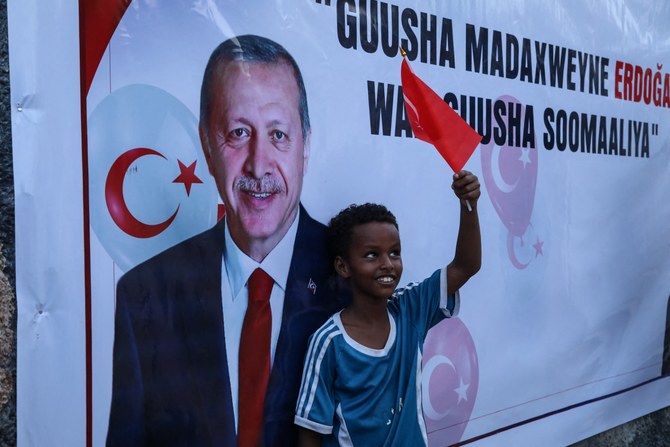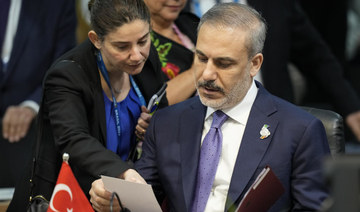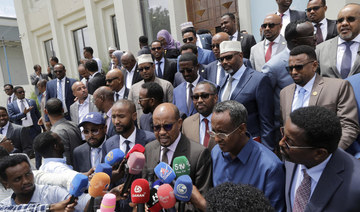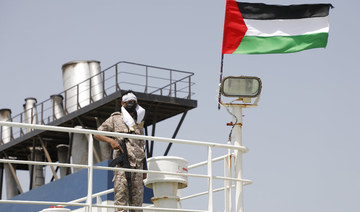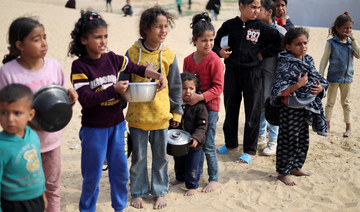Ankara: With Somalia partnering with Turkiye to help build its sea and naval capabilities, questions have now arisen about the potential regional impact of the tie-up, and why Ankara is expanding its military footprint overseas, including seeking a greater presence in the Red Sea.
Somalia’s cabinet approved on Wednesday the historic defense deal that authorized Turkiye to defend the African nation’s coastline for the next decade, amid tensions with Ethiopia, and mandated it to build a navy for the country.
Turkiye, whose navy has been operating off Somalia’s shores and in the Gulf of Aden under the UN mission since 2009, will not only build the African country’s navy but also train and equip personnel to counter illegal fishing in the latter’s territorial waters.
Turkiye has also been training Somalia’s soldiers for a few years in a bid to help the country develop its army.
Ankara also has its largest overseas military base in Mogadishu, while a Turkish company is operating the airport of the capital city.
“This agreement will put an end to the fear of terrorism, pirates, illegal fishing, poisoning, abuse and threats from abroad,” Somalia’s Prime Minister Hamza Abdi Barre was quoted by local press as saying during the cabinet meeting.
“Somalia will have a true ally, a friend, and a brother in the international arena,” he added.
Although the details of the agreement have yet to be disclosed, Somalia’s press claimed that the deal would give Turkiye 30 percent of the revenues coming from the Somali exclusive economic zone, which is rich in marine resources.
Considered a gateway to the continent, Somalia’s 3,025-km coastline is the longest in Africa.
The agreement needs to be ratified by Turkiye’s parliament and the president before being finalized.
Hakan Akbas, a senior advisor at Albright Stonebridge Group, said that this pact shows Turkiye’s growing ambition to become a key player in the Horn of Africa, enhancing its ties with Somalia and Ethiopia but excluding some Ethiopian agreements troubling Mogadishu.
“Turkiye’s recent strategic moves aim to bolster Somalia’s military, promote stability, and protect its interests through security, economic, and humanitarian efforts,” he added.
According to Akbas, this agreement reflects Turkiye’s bold foreign policy and strategy to establish key military and economic partnerships aimed at securing its interests in the region.
“This gives Somalia a very essential partner in matters of national security, counter-piracy, anti-terrorism, and border protection, including against illegal fishing. It is a win-win for both nations,” he said.
Earlier this month, Somalia’s Defense Minister Abdulkadir Mohamed Nur signed the framework agreement in Ankara that mandated Turkiye to protect Somalia’s territorial waters.
For Rashid Abdi, chief analyst at Sahan Research, a Nairobi-based think tank, the deal gives Turkiye huge leverage to reshape Somalia and the Horn of Africa.
“Turkish navy will help rebuild Somali navy and will deploy ships to patrol its maritime Economic Protection Zone. Turkiye is now positioned to become Somalia’s top strategic partner,” he told Arab News.
However tensions still remain high in the region especially after Ethiopia and the breakaway Somaliland reached an agreement granting landlocked Addis Ababa access to the Red Sea and ensuring the recognition of Somaliland as an independent state.
Somaliland is still recognized internationally as part of Somalia although it controversially declared its independence in 1991. The deal had infuriated Somalia which considered it a breach of its territorial sovereignty.
As Ankara also has close ties with Ethiopia and provided it with military drones in 2022, how Turkiye will find a balance between the national interests of both countries remains to be seen especially regarding maritime violations.
Abdi thinks that the agreement will put Turkiye in a tight spot if Ankara seeks to enforce Somali sovereignty in breakaway Somaliland.
“It will also be viewed as provocative by Ethiopia which wants a military base on the Somaliland coast close to Bab Al-Mandeb,” he said.
“Turkiye has huge commercial interest in Ethiopia. Turkiye helped Ethiopian premier end the conflict in Tigray. For the time being, Turkiye will be walking a tightrope. It is therefore uncertain how Ankara will balance the competing demands of its two Horn allies — Ethiopia and Somalia. Ethiopia is a big market, home of the African Union and a regional hegemon. Upsetting Ethiopia and countering its regional interests in Somaliland will put Addis Ababa on a confrontation course with Ankara,” he added.
In December, the UN Security Council lifted its three-decade arms embargo on Somalia’s government.
“The latest defense deal with Somalia is anchored in a meticulously crafted intellectual framework spanning a decade,” said international relations professor Serhat Guvenc of Istanbul’s Kadir Has University.
“Ankara recently announced the provision of a second batch of MILGEM corvettes to the Ukrainian navy. Turkiye’s forthcoming endeavor to assist Somalia in bolstering its naval forces will mark the country’s second significant contribution to a foreign navy,” he added.
According to Guvenc, Turkiye’s strategy in Africa began with bolstering trade and economic ties before seeking to provide military training and high-end Turkish weapons systems.
“Turkiye recently constructed Istanbul-class frigates for its naval forces exemplifying the country’s expanding maritime prowess extending from Istanbul to the Gulf of Aden without requiring refueling stops,” he said.
Turkiye also took part in the multinational Combined Task Force 151 to prevent piracy attacks in the Gulf of Aden and off the eastern coast of Somalia. Turkiye took command of the task force six times.
“Turkish Naval Forces have shown a high effectiveness and even in instances where Turkiye didn’t commit ships, its commanders were preferred due to their intimate understanding of regional challenges,” said Guvenc.
Despite acknowledging the strategic significance of the deal, experts caution that its implementation demands substantial investment and logistical capabilities from Turkiye.
“In 2014, Turkish Naval Forces started its circumnavigation of Africa and toured the continent twice. But this time, Turkiye needs to double and maybe triple its naval forces for effective outreach across the vast region,” Guvenc said.
“Overseas bases give countries a significant prestige and put them among countries which have outreach to the remote regions of the world. It is a key indicator for the power hierarchies because it means that the country is able to project strategic power from its naval influence,” he added.
However, Guvenc sees some “political” risks with the deal.
“Turkiye has traditionally refrained from taking part in intra-African conflicts. It has always taken a standing that was above conflicts. But it remains to be seen to what extent it could safeguard Somali interests by force or whether it would have to be involved in local conflicts. It is also technically difficult to protect the exclusive economic zone of Somalia which intersects with issues like illegal fishing activities and potential clashes with other nations in the region,” he said.



